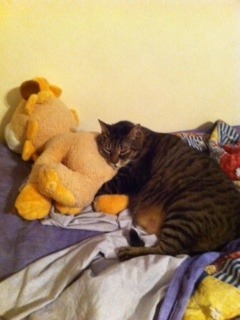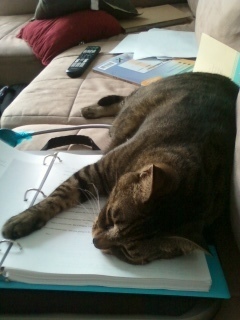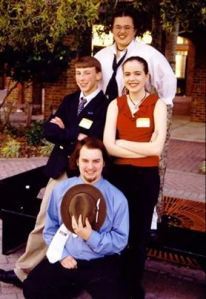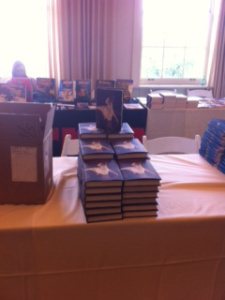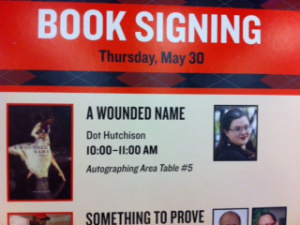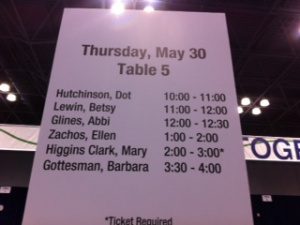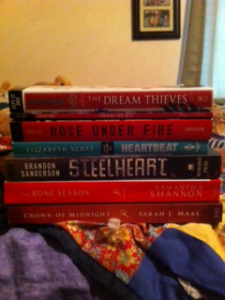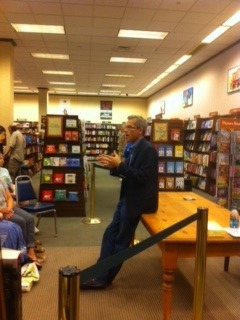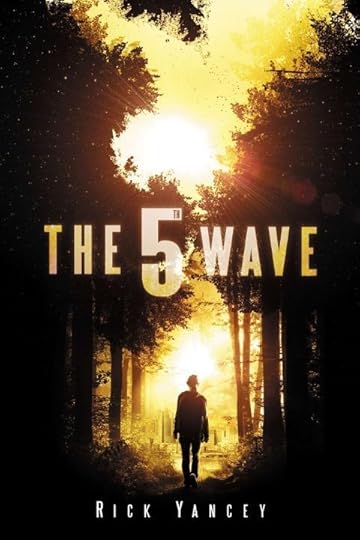Dot Hutchison's Blog, page 5
June 30, 2013
An Old, Dear Friend
Meet Aristotle:
We first met him thirteen years ago, when he was about a year old. He and his brother and sister were rescued from a kill-shelter by a pair of ladies in our church choir, who were then informed that one more animal in the house meant one less husband, so they brought them to choir practice to try to find them homes. As soon as she saw the cats, my mom turned to me and said, very firmly, “NO.” I could play, but we were not- she repeated NOT- bringing an animal home. All three cats were beautiful and friendly, but I fell in love with the striped one, and I played with him all through practice. When it was time to go, Mom told me to put him back in the box.
This cat snuggled deeper into my arms, ever-so-gently put his paw against my cheek, turned to look at my mother, and started purring.
I didn’t catch the first few words my mother muttered, probably because she didn’t want to swear in church, but the last word was opportunist, and he came home with us.
I’m still not sure how it was that my brother got to name MY cat. I wanted to name him McGonagall, because when he was younger (before he reached Jabba the Hutt proportions) he lacked only the square markings around the eyes to look just like Professor McGonagall’s animagus in the first Harry Potter movie. And yet, somehow, he got the name Aristotle, and I had to be content with giving him McGonagall as a middle name. Aristotle McGonagall Hutchison.
Over the years, he acquired a wide variety of nicknames: Stotle, Corky, Herpes (which, somehow, isn’t as gross as it sounds- in cats, the herpes virus is a respiratory infection that acts rather like a cold, and is responsible for chronic sneezing). As he got older and fatter, unable to lose weight due to metabolic damage from bladder crystals, he grew (and grew!) into Fat Cat, Meatball, Walrus, Sea Lion, and Seal Pup. Being a cat, of course, he alternated between answering to all of these plus anything else that came to mind, or answering to none of them.
Aristotle was a mellow guy. He loved to play, of course, but it was pretty hard to truly bother him. He didn’t growl, he didn’t claw or bite. Well, not without direction provocation. In thirteen years, the only time he ever bit me was when I was holding him still against my chest so my brother could scour his infected claw beds. He played with our dog, Cinnamon, who was the same size he was- and significantly lighter. He wrestled with my brother’s cat when we lived together, and when we had a third roommate with a cat that thought SHE was queen of the castle, Stotle only put up with it for so long before he rolled over and smacked her across the face. After that all he had to do was roll over or lift a paw, and that cat would streak away and stop bullying them for a while.
He was a hunter though, when he was still an outdoor cat. We lived in a house with a dog door that I think Stotle used more than Cinnamon, and he’d bring us tokens of love from his endeavours. Lizards, usually. Most of the time they were even dead. But sometimes there were birds, or mice. One morning I woke up to a scream, rushed out to the hall, and there on the inside of the dog door, neatly laid out on the rug leading into the kitchen, was a dead squirrel that my mother had nearly stepped on as she made her way to coffee.
One of his favorite things to do was to help me with my writing projects-
-by reminding me of the importance of taking frequent breaks. It never really mattered what I was working on, he was there to sprawl across it. I think the biggest conundrum of his every day life was trying to figure out how he could lay across All The Things simultaneously. Internet laptop, writing laptop, various notebooks or clipboards or binders. Just a week and a half ago, I had three binders, two magazines, and my nook spread out across the bed as I was working on something, and he kept shifting position trying to get at least a paw on all of them. In the picture above, he was helping me with my first round of edits with Editor Andrew, on what became A Wounded Name.
Lately, his favorite spot to sit, when he’s not sitting on top of me or my projects, is the box of author copies. I have over a dozen boxes of books scattered around the room right now, while I’ve been camped out at my mom’s, but he always goes for that one, even if there are things on that one and none on the one next to it. Always the one with the author copies. I even did an experiment where I moved that box across the room and put another in its place- he still went for the one with my book in it.
Eight days ago, Stotle was diagnosed with newly-transitioned diabetes. As a diagnosis, it wasn’t really a shock. Given the long-term damage from his way-too-close near-death experience with the bladder crystals nine years ago, diabetes was pretty much an inevitability, and we were prepared for that piece. We’d caught it extremely early in the transition, and the vet was very optimistic that we’d get this regulated quickly and he’d be fine, just needing twice-daily insulin injections. Except…a couple of days later he crashed and crashed hard into what’s called DKA. Basically, it’s the step below diabetic coma. He required hospitalization to try to get his glucose levels under control, as well as get hum rehydrated. In three days he’d lost over two pounds, most of that purely from dehydration because he had no appetite or thirst. We shuffled him between the vet’s day hospital and the emergency vet’s night care, and in addition to his glucose and proteins being out of whack, his electrolytes were badly upset by both the dehydration and the insulin.
He started feeling just well enough that first night to get feisty, and by that I mean pissed off, cranky, and aggressive as hell whenever anyone came near him. I came to pick him up in the morning so I could take him back to the day vet’s and as I sat in the exam room, I could hear a cat in the back, yowling and growling and generally giving the techs hell, and I was like the mom in the supermarket who hears a crash and a yell and can only stand there with eyes closed murmuring “Please don’t let be my kid, please don’t let that be my kid.”
It was my kid.
But after days of intense care, he wasn’t stabilizing. He was calm with me but feisty with everyone else. The emergency vet has a policy of no personal effects with the pets, but they let me bring his bed from home to see if that could reduce the stress a bit. He barely touches the bed when he’s home, but he stayed in it all Friday night. The reduction in stress didn’t really help, though, except to make him more comfortable. His glucose levels were still too high and his electrolytes were too low, despite insulin every four hours and a constant drip of enriched fluids. The emergency vet was willing to tell us what his regular vet wasn’t: at most, Aristotle had a year left, but the chances were high (like 90%) that IF he came out of DKA this time, which was not only not guaranteed but at this point not very likely, he would definitely crash into it again. When they brought him into the exam room for us to see, we could hear his wheezing from across the room. He’s an enormously fat cat, so he’s wheezed for years, but only ever when he was on his back or side. Now he was wheezing when he was sitting or laying normally, indicative of early congestive heart failure.
He wasn’t going to get better, and he wasn’t going to be comfortable.
The decision to let him go was the hardest I’ve ever made in my life. I knew Friday evening that it was something I needed to seriously consider, but at first all I could do was sit there and sob. Thirteen years Aristotle has been part of our family. He’s the reason we know that you can return a ladder to Home Depot if the only thing you use it for is to get a cat out of a tree. He’s the reason my poor penguin Pillow Pet looks disfigured, because Aristotle decided that was HIS penguin. He’s the reason I know cats actually pay attention to what people are doing in the bathroom- ten years ago, I kept forgetting to change his litter box, so he’d piss in the toilet and then paw at the handle to try to flush it.
Seriously.
Aristotle has been with me through four houses, six apartments, and eleven moves. We drove all the way to Colorado and back, and he hates seeing what’s outside the car when he travels, so he chilled all day in a laundry basket covered with a towel, and then explored the hotel rooms at night. He never minded when I was having a bad day and cried all over him as we snuggled, and he LOVED to cuddle up to my best friend whenever she came to visit, even knowing she was just going to shove him off the bed. Honestly, I think that was his favorite part, trying to see how long he could be there before she noticed him and pushed him away. (she’s allergic to cats, by the way, not being hateful). I always had to do the Stingray Shuffle on the way to the bathroom at night because I never knew if he was going to be sleeping right where I needed to put my feet. He’d pounce on your shoes as soon as you took them off, wrapping himself around them and shoving his whole head inside, the stinkier the better. And when he was upset, if there’d been a sudden bang or a knock on the door, if something was stressing him out if we were at the vet’s, he’d curl up close and bury his head down my shirt.
So here’s to Aristotle. I’m grateful for his love and companionship, for his playfulness, his mellowness, I’m grateful for the joy he brought me and the comfort he gave me. Letting him go was the hardest thing I’ve ever done, but he died loved, he died calm and comfortable, not in pain and panic and fear, and he fell asleep in my arms.


June 16, 2013
I Have a Voice!
Well, I mean, obviously, I’ve always had a voice, and it doesn’t need to be the spoken word to prove that, but still.
One of the weirder aspects of social media is that we get used to thinking of people we’ve never met as a particular icon or outfit or look, so when we actually see them in person it’s like “I’m sorry, who are you?” It’s not like the pop culture celebrity fixation. Our celebrities are celebrated for their books, not plastered everywhere so you can effortlessly recognize them.
But, while I was up at BEA, I recorded a podcast with Book Bliss, and it’s up! You can listen to it .
And can I just say, I don’t think there’s ever been a person in the history of recording that’s listened to their voice afterwards and said “YES! That is EXACTLY what I thought I would sound like!”


June 15, 2013
A Look Behind A Wounded Name
When you tell someone about a project you’re writing or have written, one of the first questions you usually hear is “Where did it come from?” Or, as my agent puts it, “Your brain must be a terrifying place.” (Reason a billion and one that Sandy and I are a really great fit) And most of the time, someone asks me this, and I just kind of start to stammer. The truth is, I have no idea where most of my stories come from. I remember strange things, I think of strange things, and they all just sort of stew together in my brain until suddenly two or more things click together and I sit up and go OOH! THAT COULD WORK!! I can occasionally trace back influences, things that have been roiling around in my mind for weeks or months or even years, but I can only really think of two projects where I could specifically point to something and say “This, this is where it came from”.
But A Wounded Name is one of those projects.
In some ways, it starts out as a pretty broad answer: a lifelong love of Shakespeare. I was the kid who brought Hamlet and Much Ado About Nothing and Measure for Measure to elementary school with me, struggling through the language, and even though I got none of the subtleties or dirty jokes, I could more or less understand what was going on. It was in eighth grade that the appreciation shifted into something deeper, and there are two reasons for that.
The first was that my friend Carl, who was in Junior Thespians with me, performed the dagger monologue from Macbeth for the Districts and State Competitions/Festivals. And did it REALLY WELL. Even the kids in the audience who’d never come up against Shakespeare before got it. Even if they didn’t know the story or the character, they knew that this guy was coming seriously unhinged- and planning something really awful.
The second was that our gifted humanities teacher, Mrs. Shaughnessy, introduced us to Shakespeare in a way that was FUN. We read through Henry IV, Part I in class, and it’s a history play, so it’s easy to get bogged down in the poetically framed politics, but she very brilliantly focused on Hal and Falstaff. Dude, Shakespeare was FUNNY! And PERVY! We were cracking up about it, and when there was a filthy joke based off of slang we didn’t understand, she explained it. This sweet, delicate-looking, soft-spoken teacher in her fifties actually stood there and explained to teenagers that this page and a half of text was actually full of jokes about whether or not a guy’s junk worked. And, to reward us for successfully getting through the play, we took an end of year field trip to the Alabama Shakespeare Festival, where they were performing As You Like It, and we DIED. The performance was amazing, incredibly well done, and that’s when we finally understood that Shakespeare was meant to be performed, not read.
Seriously.
Shakespeare wasn’t published within his lifetime. It was after his death that some of his friends got together and published his plays. Before that point, you experienced Shakespeare by actually experiencing it, by seeing it, hearing it, feeling it. Shakespeare is meant to be performed, and some of us took that to heart.
The next year, three of my good friends and I decided we wanted to do an ensemble acting piece for Districts. We were nervous, because we were freshmen in a program that wasn’t, at the time, freshmen friendly, but two of us had done the summer theatre program with the school and gotten to know a bunch of the older kids, and more importantly the teacher, who was also an old friend of my family, and we figured if we put together something really good, it wouldn’t matter that we were younger, maybe we could still get a spot. I honestly don’t remember how we ended up with the play we did- I remember us looking, all of us digging into any play we could get our hands on. I don’t remember who found the winner.
Rosencrantz and Guildenstern are Dead, by Tom Stoppard, is an absolutely brilliant play that’s woven through Hamlet, but it’s pretty much based off of two lines.
TWO LINES. In all of Hamlet an entire play was able to be based off of TWO LINES.
And they’re an innocuous two line set, nothing glorious or earth-shattering.
CLAUDIUS: Thank you, Rosencrantz, and gentle Guildenstern.
GERTRUDE: Thank you, Guildenstern, and gentle Rosencrantz.
Now this is one of those places where performance is everything, because you can do a LOT of different things with those two lines. Most productions just kind of gloss over them. After all, Ros and Guil are hardly significant characters. They are so generally un-important, in fact, that Shakespeare gives us absolutely nothing to distinguish between them. They are utterly non-distinct, a pair never seen separated. So, some productions play off of that by saying that Claudius doesn’t know them that well, that he puts the adjective with the wrong name, and so Gertrude is gently correcting him with her statement.
Stoppard took those two lines and spun out this wonderful journey of one existential crisis after another, where these two characters are totally at sea in everything that’s going on around them, and lost as they are, can’t help but cry out again and again WHO AM I AND WHAT AM I DOING HERE? Guildenstern even argues, though he thinks he’s talking about the situation, that rather than being opposite sides of the same coin, they are actually the same sides of two coins, able to be manipulated separately and yet still the same thing. This play is fiendishly intelligent, full of wordplay that would make the Bard proud, a tragic sense of inevitability, and yet an unapologetic love of the absurd. Ros and Guil are adrift, are utterly incapable of understanding everything going on around them because Hamlet is, after all, a play where everyone has secrets from each other, but they’re being manipulated by EVERYONE, everyone is trying to use them for their own ends and aims. And in Stoppard’s play, the director is the devious, somewhat implacable Player, leader of the company Hamlet hires for his trap.
We fell in love with this play, and we finally found a scene we thought would work for all four of us, where Hamlet welcomes his pair of old school friends to Elsinore and bids them be respectful to the Player. From that point on, Ros and Guil are trying to figure out what’s going on, and the Player is…well, let’s call it less than direct. There’s a lot of stumbling over words, because English is, after all, a bizarre language, imprecise at the best of times. We practiced and practiced and practiced, we watched two or three different movie versions of Hamlet, we watched the movie production with Tim Roth, Gary Oldman, and Richard Dreyfuss (which is brilliant, by the way), we argued ENDLESSLY over stupid things. Seriously, we spent probably five weeks arguing over the pronunciation of gesture until we finally asked someone. But we had a fairly solid piece when we auditioned, and so our teacher gave us a slot for Districts, and we started practicing even harder.
Our rehearsals often got sidetracked, because as much as we wanted to polish this and make it awesome, the word-play was fantastically fun. We kept looking outside of the scene, or even all the way back to Hamlet to pull in context or hints or allusions because there was just so much wealth to work it. And we asked questions. Not just what does this word mean, or what is he trying to say here, but bigger questions.
Is Hamlet actually crazy?
Does the Player know all of what’s going on?
What are the consequences of trying to understand the situation?
And we asked questions that had absolutely nothing to do with the scene, but were just such interesting questions that we couldn’t help ourselves.
Does Hamlet love Ophelia?
Why does Ophelia lose it?
How much does Gertrude know?
How much does Polonius know?
SO MANY QUESTIONS, and we could debate them endlessly. Honestly, in high school the four of us could debate almost anything endlessly, simply because the discussion itself was that much fun.
We took the piece to Districts and did REALLY well. We got straight superiors, so all three judges in the room thought that we did an amazing job. Not the absolute best job they saw in the room (Critics’ Choice) but a really solid, wonderful job. We were ecstatic. And because of those straight superiors, we automatically got one of the very few slots available for State. Which…pissed off a bunch of the upper classmen, who felt they should get preferential treatment because we had three more years ahead of us to compete. To which our teacher replied that if they wanted that badly to compete in State, they should have worked harder, done better, and ranked higher.
Our teacher didn’t really put up with anyone’s crap.
State is a lot harder than Districts- you have to get at least an excellent at Districts to be able to compete, and because of limited slots, each school tries to bring its best stuff, so the judges rank accordingly. We got an excellent at State, and were ridiculously happy about it.
Senior year, in a fit of nostalgia, we decided to do the same piece again. We hadn’t all four been in a single competition piece since freshmen year, so there was something that felt pretty right about it, and we knew even at the beginning of the year that we weren’t going to all be going to the same colleges. And this time, we had three more years of debates under our belt, three more years of independently dissecting the play we’d all fallen in love with. And someone, one of the parents, I’d suspect, decided to get a picture of us this time.
Now, keeping in mind that this picture was taken TEN AND A HALF YEARS AGO, we have, starting at twelve o’clock: me, as the Player, Betty-Jane as Rosencrantz, JD as Hamlet, and Jeff as Guildenstern.
This time, the ensemble piece wasn’t our main focus. We all had different things we were doing that year. JD was in a duet pantomime (I’m Not as Think as You Drunk I Am, which was absolutely hysterical and won Critics’ Choice), Betty-Jane had monologues and a duet acting scene that were both absolutely brilliant (and off the top of my head I can’t remember your scores, Betty-Jane, sorry!), Jeff was doing Publicity Design (Critics’ Choice and Tech District Representative), and I had a solo, a duet musical, and Playwriting (for Playwriting I received Critics’ Choice and Tech District Representative). We were mostly focused on all of that, so this piece was really just for us, something fun to do together because we’d all been so crazy busy with everything.
And it was. It was brilliant, and fun, and we did well at Districts and not quite as well at State, and that was okay. Because we loved it, and we had a blast asking all those questions again, and asking better questions, deeper questions, questions that used the play as a stepping off point and tried to apply the possible answers against the broader human condition.
Okay, we were super pretentious in high school- aren’t most high schoolers?
The next year, Jeff and I both went down to the College of Theatre and Dance at the University of South Florida, him for the technical track, me for the performance track. Our senior year, he did the theatre honors track, combining that thesis with his honors college one, and he and his honors classmates created, from the ground up, a study on Ophelia. They researched and debated and eventually wrote and designed a production called Remembrances, also known as the Ophelia project. I went to see the performance, and really, it was just brilliant. From every standpoint, honestly, the writing, the acting, the design and execution.
Its sense of time was fluid- interspersed with scenes from Hamlet were moments where the fractured pieces of Ophelia interacted, and memories of happier times with her family. It didn’t try to define Ophelia- it tried to explore her. To understand her.
During its larval stage, Jeff and I used to get together every Thursday for Wine and Laundry night. I lived in a place that didn’t have laundry facilities, and I lived in an area where you REALLY didn’t go to the all-night laundromats unless you wanted to get mugged or raped, and at that time, my weekends were dedicated to Job Number One, which was retail, Job Number Two, which was rehearsals and then performance for the Renaissance Faire, Unpaid Job Number Three, which was tech work on the shows the college put on, for which I received mandatory credits, plus working on my own honors thesis, which was a novel. The only thing that made the weekends distinct was that I didn’t have sit-down class. So, Thursday nights, where conversations would range over every possible topic, and frequently came back to Ophelia, because we both had a long-held interest in her.
Backing up slightly, at the end of my junior year, I’d proposed a thesis project that would take seven questions from/about Shakespeare’s plays and explore them as novellas. One of these seven pieces was going to be about Ophelia, a fractured time piece where her sanity has already slipped but she’s still trying to tell us the story, only she can’t piece it together in the right order. I ended up not doing that because my potential thesis advisor and I disagreed on how to approach them. I didn’t want to research other takes until after I’d written mine, so as to avoid influence, and she felt I needed to research them first so I could support my own opinion.
I love research, but an academic researcher I’ll never be.
And in a way, I was a little grateful that it fell through, because of all the questions I’d intended to face, that one TERRIFIED ME, and when it came to writing, I was only learning to be brave at that point. Back then, I thought if it scared me, that was a sign I should do something else. So, I went back and looked at the only original novel I’d ever finished, back from the beginning of freshmen year of college which desperately needed to be re-written pretty much from the ground up, and asked around for advice on who to approach as an advisor, given that the Creative Writing Dept had never waivered me in to their classes, and at the end of the year, when I met with Dr Omlor, my advisor, for my final evaluation, he told me I was an idiot if I didn’t try to get published.
Over the next few years, Ophelia kept creeping out in small ways. The next year, when I was taking a poetry class at the community college (long story), she found her way into one of the poems. The prompt was to take lines from established pieces and use them within our own poem. I borrowed from both Hamlet and T.S. Eliot (several of his poems, really), and what came out was…I loved it. And I suck at poetry, so for me to say that I love this poem is really kind of extraordinary. There was something broken about it, the way the original lines were left justified and the borrowed lines right justified, the way your eye had to travel across the page, the way the original lines could be read entirely on their own and still tell the story but the borrowed lines added something…I don’t think I’d ever loved one of my own poems before. At about the same time, I was writing a Harry Potter fanfiction called (and here I’m outing myself, oh well) “Where the Breezes Know My Name”. It’s a STRANGE little piece, but at the time it was the most poetic prose I’d ever written, and for YEARS I swore about it, because I thought it was beautiful and there was no way in hell I could unravel it from the original source enough to use it for anything original.
A few years later, I woke up in the middle of the night with Ophelia’s voice in my head, specifically the first few lines of the book, which have remained unchanged from that moment.
The sky is blue today.
Blue like glacier ice, like hidden springs. Blue like jays’ wings, peacock feathers. Blue like my mother’s skin.
Well. Hello, Ophelia!
But I was in the middle of another project at the moment, one that was quickly growing to the point that it needed to be split into two books (and will thankfully never, ever, EVER see the light of day), so I wrote down the lines on the notebook beside my bed and figured I’d forget about it.
But Ophelia, as a figment, is sneakily persistent. She’d pop up in my dreams, shoving these eerie and lovely and unsettling images at me, I’d hear her voice and write the lines down on napkins, scrap papers, business cards, sometimes even my arm or the back of my hand if I didn’t have anything else handy. Ophelia would not go away, and she was bound and determined that she wasn’t going to be quiet.
Having Ophelia in my head was like edging into a kind of insanity, and it didn’t really stop until I finally sat down, typed the first lines in a fresh word document, and let her take the reins.
From start to finish, the first draft took twenty-three days, and because of work and other obligations, I couldn’t write every day. Once I typed in the last line, it was like this massive weight was off me, like suddenly I could breathe again. For weeks, I’d been drowning in Ophelia, and suddenly my head was clear again.
But where she first started gaining form, where the questions first started giving her a distinct and permanent existence in some part of my brain, was 1999, when Jeff, JD, Betty-Jane, and I first sat together over a battered library copy of Rosencrantz and Guildenstern are Dead, which an eye towards taking it to competition.
And that is the story behind the story, behind A Wounded Name.
Until next time~
Cheers!


June 10, 2013
Cliffhanger May Be A Four-Letter Word
There are a number of words in the English language (or, honestly, probably any language) that have been used so loosely, so borderline inaccurately, for so long, the perceived meaning has started to shift. We actually have words for that (how cool is that?): connotation and denotation.
Remember those from ninth grade English?
Denotation is the literal definition of any given word. The dictionary definition, if you will. It’s the meaning that doesn’t shift much over time, or at least, is much more slow to shift. Like, a glove is an accessory/article of clothing worn over the hand with individual fingers.
Connotation is the not necessarily slang, but it’s the perceived meaning of a word. Much more so than denotation, connotation reflects the current culture. In this case, a glove isn’t only an article of clothing on the hand, it’s also a slang term for condom.
…well, I guess we know my mind’s in the gutter on a pretty regular basis.
Why do I bring up connotation and denotation? Because there are some words we use on a regular basis in talking about books that we use incorrectly.
Like dystopia. It’s become rather a catch-all for genuine dystopia, post-apocalyptic, evil modern regime, and some genre-benders that only partially fit within the definition. We use it to describe just about everything grim and touching on anything loosely governmental. BUT. The definition of dystopia (and don’t trust Merriam-Webster online, their definition sucks) is a society built upon utopian principles that, through innate human error, political or spiritual corruption, a/o self-initiated disaster, decays into something nearly a parody of its original, idealistic principles.
Here’s where we tie back into the title: cliffhanger is another term that’s experienced a shift between original and perceived meaning. We hear it being used for anything that makes you want more, anything that ends abruptly in such a way as to leave you intensely craving more.
The thing is, the original (and accurate) definition of cliffhanger is contained within the phrase itself. Cliffhanger. It came about as radio and television shows developed, and they’d leave you at the end of a week’s episode with someone literally hanging off a cliff. Does he make it? Or does he fall? Will she celebrate a rescue? Or have to plan a funeral? Do the humans understand Lassie? Or does Timmy finally drown in that damn well? You’d be left with your character in genuine, life-threatening DANGER and then have to wait until next week’s episode to find out if he or she is okay.
Here’s an example where the meaning has blurred. (WARNING: SPOILERS FOR CATCHING FIRE BY SUZANNE COLLINS BELOW) If you talk to most people who’ve read Catching Fire, they call the ending a cliffhanger. What?! *gasp!* There’s no District 12 anymore?! *shock!* It’s not, though. A cliffhanger, that is, it’s sort of a shock if you haven’t been paying attention to the repeated stories of the 13th District that wasn’t really mentioned at all in the first book. It’s not a cliffhanger because it’s not leaving us in the middle of active (or if you’re a Tom Clancy fan, clear and present) danger. Katniss and a handful of others have been rescued from the arena, they’re on their way to promised safety, the main action of the second book is finished. The “There is no District Twelve, Katniss” is the lead-in to the next book, a way to spark the interest that naturally wanes as the resolution ties neatly together, a way to keep you chomping at the bit for the next installment. It’s the carrot dangling from the end of the stick.
But it’s not dangling over the end of a cliff.
On my second What I’ve Been Reading post, The Streelight Reader asked me if The Dream Thieves by Maggie Stiefvater ends in a cliffhanger, and I had to think about what to answer. (Don’t worry, NO SPOILERS) Because, by the current definition of cliffhanger, by the connotation of the word…sure, it’s a bit abrupt, it’s a definite lead in to the next book, and it’s a pair of sentences that make your heart skip few beats as you stare at the page.
But I wouldn’t call it a cliffhanger.
One of the things I love about Maggie Stiefvater’s books, especially the two we’ve seen thus far in the Raven Cycle, is that each book has its own story. The series has an arching story, an overall goal and way of getting there, but the individual books aren’t merely installments. Each book has its own arc, has its own threads that mostly resolve and tie back together even as they form a pattern within the larger story.
Do you remember those friendship bracelets that little kids make with embroidery floss? (Or not so little kids, given that I made one right before BEA) There’s one that’s called, among other names, a Triple Diamond. Hang on, let me throw in a picture:
It uses twenty strands of floss in five different colors, knotting in chevrons and inverted chevrons to form the diamonds, and you have to be able to knot both left and right, sometimes switching direction in the middle of a knot. The overall design, the finished pattern, is like the series. The story of the Raven Cycle is that completed work, with all those individual diamonds linking together into a cohesive creation. But every thread, every color, every individual knot, those are the elements of the books on their own. Just as the main characters can each be assigned a thread color and we can call it that character’s path through the series, we can also call those threads individual plot elements. They have to resolve in every set in order to continue through the rest of the books.
So the black thread (let’s call it Ronan) can’t just dangle off into nothingness and still be fully present through the resolution of the series. His smaller stories, his episodes, HAVE to resolve within each set.
The Dream Thieves is not merely a continuation of the quest for Glendower. It’s not merely a second installment, continuing the same story and trudging relentlessly onward. This is its own book, its own story, a set of snarls and knots that resolves into a part of the larger pattern, even as the threads set themselves for the next block of pattern. Without that preparation, without those two sentences that make your gut clench with wonder and anticipation and just a bit of fear, things would just kind of…fizzle…after the necessary resolution of those smaller threads.
But we’re not left in the middle of something. We’re not left with our Raven Boys (including Blue) in imminent peril. We’re not left with them over the lip of a cliff, literal or metaphorical. Instead, we’re left with a clue- the frame of a question that hasn’t yet found its voice or shuffled the words into the right order to follow the transition from declarative to inquisitive. That question, once it’s found, will be the starting block for the third book (and seriously, can’t wait; if I haven’t scared you off with grammar and craft-based-analogies, READ THESE BOOKS IF YOU HAVEN’T ALREADY), but it’s necessarily built off the resolution of the book two story.
This is a very long answer to what’s probably a simple question, Streetlight Reader, but it’s something I’ve been thinking about for a while, as I see the word cliffhanger more and more in book reviews.
Until next time~
Cheers!


June 4, 2013
What I’ve Been Reading 2
You know that thing where you really do intend to do something regularly, Best Intentions and all that, and you just kind of…don’t?
Welcome to What I’ve Been Reading.
So we’ll hit the highlights, rather than be wholly inclusive.
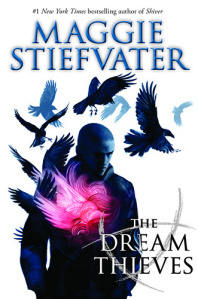 I just last night (very nearly this morning, I stayed up WAY too late reading this one) finished The Dream Thieves, by Maggie Stiefvater, and YOU GUYS! I am utterly incapable of talking intelligently about this book. Every Stiefvater experience just keeps getting better. This book is smart, and funny, and devastating, and so brilliantly put together that as soon as I finished it, I wanted to go back through to see if I could figure out how the frack she does it. I love that the shifting perspectives let us see such varying elements of each character, and yet every perspective shares some common threads- for example, Blue, Gansey, Adam, and Ronan all see some different specifics of Gansey, and yet they’re all simply shading in subtleties of the same person. Even as they each see something (not quite someone) different, each perspective is still distinctly recognizable. Even down to a structural level, the use of parallel sentences is brilliant, leading the reader into a solid impact that’s no less strong for falling into a rhythm. And the beauty isn’t just in the language, or in the characters, though both elements have more than their share of beauty- seriously, the characters are astonishing, gorgeous and rich and so very, very broken, each in their own ways, and we see not only the way they make each other whole but they way they all poke at those sharp, prickly, dangerous edges- but also in the subject matter, the Great Quest, and the history that’s woven through. This was one of the handful of books I was REALLY hoping to get at BEA, and thanks to the folk at the Scholastic booth kindly telling me when to come back, I was able to come home with one. It comes out in September, and seriously, if you’ve haven’t read The Raven Boys, DO IT NOW so you can read this one as soon as it comes out.
I just last night (very nearly this morning, I stayed up WAY too late reading this one) finished The Dream Thieves, by Maggie Stiefvater, and YOU GUYS! I am utterly incapable of talking intelligently about this book. Every Stiefvater experience just keeps getting better. This book is smart, and funny, and devastating, and so brilliantly put together that as soon as I finished it, I wanted to go back through to see if I could figure out how the frack she does it. I love that the shifting perspectives let us see such varying elements of each character, and yet every perspective shares some common threads- for example, Blue, Gansey, Adam, and Ronan all see some different specifics of Gansey, and yet they’re all simply shading in subtleties of the same person. Even as they each see something (not quite someone) different, each perspective is still distinctly recognizable. Even down to a structural level, the use of parallel sentences is brilliant, leading the reader into a solid impact that’s no less strong for falling into a rhythm. And the beauty isn’t just in the language, or in the characters, though both elements have more than their share of beauty- seriously, the characters are astonishing, gorgeous and rich and so very, very broken, each in their own ways, and we see not only the way they make each other whole but they way they all poke at those sharp, prickly, dangerous edges- but also in the subject matter, the Great Quest, and the history that’s woven through. This was one of the handful of books I was REALLY hoping to get at BEA, and thanks to the folk at the Scholastic booth kindly telling me when to come back, I was able to come home with one. It comes out in September, and seriously, if you’ve haven’t read The Raven Boys, DO IT NOW so you can read this one as soon as it comes out.
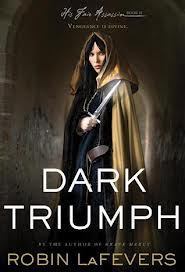 Dark Triumph, by Robin LaFevers, is also a sequel, in this case to last year’s Grave Mercy. I totally gushed about that one when I read it, but as a refresher: assassin nuns in the 15th century Breton court. It was dark and elegant and riveting, and so seamlessly, flawlessly woven through real history that I gave it a second reading purely so I could compare it to a few non-fiction sources. Totally mind-blowing. Its sequel does not disappoint. We follow Sybella this time, Ismae’s sister-friend from the convent, who’s only ever clinging to sanity in some ways. Even in the midst of her private war with the abbess of St. Mortain’s, the convent was a refuge, and on the orders of the abbess, Sybella has gone back into the not-so-private hell that is her family’s house. This book is terrifying in some respects, largely because of the serious abuses Sybella endures and the desperation with which she clings to fragile threads that might be more ephemeral even than hope, but by the same measure, it’s perhaps more redemptive than Grave Mercy as well. Ismae’s journey was hard, a self-discovery and a true independence, but Sybella’s journey is hellish and raw and beautiful, and the trust and hope that shimmer together into a single being is amazing to watch. It’s a well-balanced story, with action and grace and the full range of goodness (and not) of which Man is capable. If you enjoyed the first book, this one is absolutely not to be missed.
Dark Triumph, by Robin LaFevers, is also a sequel, in this case to last year’s Grave Mercy. I totally gushed about that one when I read it, but as a refresher: assassin nuns in the 15th century Breton court. It was dark and elegant and riveting, and so seamlessly, flawlessly woven through real history that I gave it a second reading purely so I could compare it to a few non-fiction sources. Totally mind-blowing. Its sequel does not disappoint. We follow Sybella this time, Ismae’s sister-friend from the convent, who’s only ever clinging to sanity in some ways. Even in the midst of her private war with the abbess of St. Mortain’s, the convent was a refuge, and on the orders of the abbess, Sybella has gone back into the not-so-private hell that is her family’s house. This book is terrifying in some respects, largely because of the serious abuses Sybella endures and the desperation with which she clings to fragile threads that might be more ephemeral even than hope, but by the same measure, it’s perhaps more redemptive than Grave Mercy as well. Ismae’s journey was hard, a self-discovery and a true independence, but Sybella’s journey is hellish and raw and beautiful, and the trust and hope that shimmer together into a single being is amazing to watch. It’s a well-balanced story, with action and grace and the full range of goodness (and not) of which Man is capable. If you enjoyed the first book, this one is absolutely not to be missed.
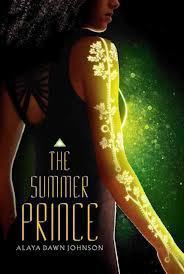 I mentioned this one a while back as one I was still in the middle of, and WOW. The Summer Prince, by Alaya Dawn Johnson, was kind of a weird book for me. It’s one I thought about putting down a hundred times, and yet couldn’t quite do it. That changed a little over halfway through, and suddenly the only reasons I wanted to put it down were lines and images to savor. It’s a sneaky, sneaky book, its darkness hidden for a long time beneath bright lights and festivals, and yet the decay is always there, much like the lowest layer of the city. The characters are strong and bold and almost frantically drawn, almost too alive in this fragile moment, where life and prosperity and order is brought about by a season of chaos and a ritual of death. It’s sexy and sharp-edged and so very, very sad, and I love that it deals with an amalgamated Brazilian culture, love that we get this glimpse into something that, even as it strains to move beyond its roots, clings to them in culture and tradition. The music comes off the page, the drop-dead sexy dances, even the tangy stench of the algae vats and the copper tang of blood. Be patient with this one- it takes a while for the language (the slang) to feel natural, and it cuts in and out of things for a bit, but it is totally worth the effort. This book blew me away.
I mentioned this one a while back as one I was still in the middle of, and WOW. The Summer Prince, by Alaya Dawn Johnson, was kind of a weird book for me. It’s one I thought about putting down a hundred times, and yet couldn’t quite do it. That changed a little over halfway through, and suddenly the only reasons I wanted to put it down were lines and images to savor. It’s a sneaky, sneaky book, its darkness hidden for a long time beneath bright lights and festivals, and yet the decay is always there, much like the lowest layer of the city. The characters are strong and bold and almost frantically drawn, almost too alive in this fragile moment, where life and prosperity and order is brought about by a season of chaos and a ritual of death. It’s sexy and sharp-edged and so very, very sad, and I love that it deals with an amalgamated Brazilian culture, love that we get this glimpse into something that, even as it strains to move beyond its roots, clings to them in culture and tradition. The music comes off the page, the drop-dead sexy dances, even the tangy stench of the algae vats and the copper tang of blood. Be patient with this one- it takes a while for the language (the slang) to feel natural, and it cuts in and out of things for a bit, but it is totally worth the effort. This book blew me away.
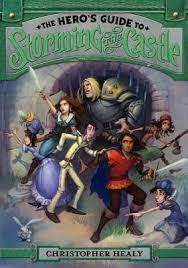 Another sequel, but a Middle Grade this time, and TOTALLY AWESOME. The Hero’s Guide to Storming the Castle, by Christopher Healy, picks up not long after The Hero’s Guide to Saving Your Kingdom. Most of our Princes Charming (rather than Prince Charmings) have separated back to their home kingdoms, but soon Princess Briar’s delightfully shrewish ways have them yanked back together for a chance of saving everything as they know it- if they can stop arguing. Accompanied with incredible illustrations, this volume has the same tongue-in-cheek love of the absurd that made the first one such a stand out, including (but not limited to): correct grammar, un-lawful de-kidneying, hysterical nicknames, and so much more. It’s a great spin on classic characters, each one standing out, each richly drawn (often literally, in the corners of the pages), and each with a strong mix of virtues and flaws- some more obvious than others. It’s an unusual Middle Grade in that most of the characters are adults, some of them in fact married, but they’re hugely fun and we still get to see them grow. This book is a magnificent adventure from beginning to end, and the idea of waiting another year for the next one is kind of painful.
Another sequel, but a Middle Grade this time, and TOTALLY AWESOME. The Hero’s Guide to Storming the Castle, by Christopher Healy, picks up not long after The Hero’s Guide to Saving Your Kingdom. Most of our Princes Charming (rather than Prince Charmings) have separated back to their home kingdoms, but soon Princess Briar’s delightfully shrewish ways have them yanked back together for a chance of saving everything as they know it- if they can stop arguing. Accompanied with incredible illustrations, this volume has the same tongue-in-cheek love of the absurd that made the first one such a stand out, including (but not limited to): correct grammar, un-lawful de-kidneying, hysterical nicknames, and so much more. It’s a great spin on classic characters, each one standing out, each richly drawn (often literally, in the corners of the pages), and each with a strong mix of virtues and flaws- some more obvious than others. It’s an unusual Middle Grade in that most of the characters are adults, some of them in fact married, but they’re hugely fun and we still get to see them grow. This book is a magnificent adventure from beginning to end, and the idea of waiting another year for the next one is kind of painful.
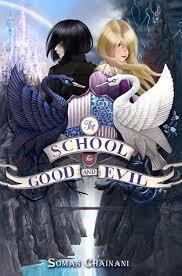 The School for Good and Evil, by Soman Chainani, proved to be my mixed-bag-book for this round. It’s a fantastic concept- two kids kidnapped from a village in the woods and taken to the schools for good and evil, one to each, where they learn to be the type of fairy-tale characters they’ve grown up reading- only pretty, pink Sophie, spoiled and passionately-convinced of her own princessness, is taken to the school for evil, whereas bug-eyed, drab, greasy haired Agatha is taken to the school for good. Convinced that there’s been a mistake, the girls are desperate to make things right- only they have a very different idea of what their goal should be. In a lot of ways, this book was amazing. The schools are beautifully creepy, and there’s a world of fun in the details, and Sophie and Agatha are incredibly well-drawn, giving the reader a much clearer view of both girls than either have or themselves or each other. There’s a prophecy, an enigmatic and potentially dangerous figure, a series of challenges…this book really does have a lot of amazing elements to it. Really, there were only two things that bothered me. One: the ending. Without spoilers, it seemed very…I dunno. Not quite abrupt, more like it forgot it had to wind things up and so the curtain came down before the actors were really ready. Like the story was so much fun that the characters (or the author) didn’t want it to have to end. The second prickle was the bigger one, though- this books comes off as strangely homophobic, at least in hints. The friendship between Sophie and Agatha is both complex and complicated, and there exists a very real, very strong, and very one-sided love that doesn’t have to be given a name. The book alternates between avidly avoiding calling it love and throwing itself at an attempted definition that comes off as both awkward and off-putting. Love is a complicated thing, romance being only one rather small facet of it, and truth be told, their friendship didn’t need a name. The realizations they both make in the course of the book, the understanding each in her own way gains (especially Agatha- she’s unabashedly my favorite, even though there is a character named Dot who’s always eating chocolate), they didn’t need to be nailed down into something awkward. It left me closing the book and going “huh” rather than cheering as I had spent so much of the book wanting to do. I enjoyed most of it, but the unsettling bits linger. If any of you read this, I’m very curious to know what you think.
The School for Good and Evil, by Soman Chainani, proved to be my mixed-bag-book for this round. It’s a fantastic concept- two kids kidnapped from a village in the woods and taken to the schools for good and evil, one to each, where they learn to be the type of fairy-tale characters they’ve grown up reading- only pretty, pink Sophie, spoiled and passionately-convinced of her own princessness, is taken to the school for evil, whereas bug-eyed, drab, greasy haired Agatha is taken to the school for good. Convinced that there’s been a mistake, the girls are desperate to make things right- only they have a very different idea of what their goal should be. In a lot of ways, this book was amazing. The schools are beautifully creepy, and there’s a world of fun in the details, and Sophie and Agatha are incredibly well-drawn, giving the reader a much clearer view of both girls than either have or themselves or each other. There’s a prophecy, an enigmatic and potentially dangerous figure, a series of challenges…this book really does have a lot of amazing elements to it. Really, there were only two things that bothered me. One: the ending. Without spoilers, it seemed very…I dunno. Not quite abrupt, more like it forgot it had to wind things up and so the curtain came down before the actors were really ready. Like the story was so much fun that the characters (or the author) didn’t want it to have to end. The second prickle was the bigger one, though- this books comes off as strangely homophobic, at least in hints. The friendship between Sophie and Agatha is both complex and complicated, and there exists a very real, very strong, and very one-sided love that doesn’t have to be given a name. The book alternates between avidly avoiding calling it love and throwing itself at an attempted definition that comes off as both awkward and off-putting. Love is a complicated thing, romance being only one rather small facet of it, and truth be told, their friendship didn’t need a name. The realizations they both make in the course of the book, the understanding each in her own way gains (especially Agatha- she’s unabashedly my favorite, even though there is a character named Dot who’s always eating chocolate), they didn’t need to be nailed down into something awkward. It left me closing the book and going “huh” rather than cheering as I had spent so much of the book wanting to do. I enjoyed most of it, but the unsettling bits linger. If any of you read this, I’m very curious to know what you think.
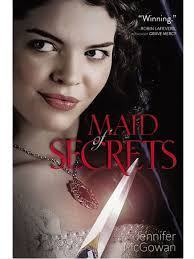 Last one for this round, Maid of Secrets, by Jennifer McGowan. Set in the early court of Elizabeth I, newly ascended to her throne, this book follows Meg Fellowes, an acting-troupe raised thief and con-artist kidnapped into the queen’s Court to serve as a spy for the queen and two of her shadow advisors. I never completely fell in love with this book, and I think that’s more due to stress while I was reading it than anything else, but I did really, REALLY enjoy it. I come from an acting background, and part of that was in Renaissance faires, so opening the pages kind of felt like coming home. I liked that the language gave away its origins and yet always remained accessible to a modern audience, and the attention to detail in clothing and small customs was brilliant. Meg is smart, resourceful, unabashedly ignorant of the larger social graces, and totally over her head in Court. I loved that the Spanish Court, largely a source of enigmatic animosity through the book (and history), is never drawn as a caricature. Those characters are just as distinct as the English players, and those we get to know are well-rounded. Meg’s fellow Maids are unique, each bringing different strengths to the group, and we actually get to watch them finally become a team, rather than just a group. It weaves through the very real intrigue that marked so much of the Elizabethan nobility, especially the troubles that came of having a young, resolutely unmarried, unswayably Protestant queen in a largely male, Catholic world of power. It sounds like this might be the first of a series? I HOPE, and I very much look forward to more of Meg’s adventures.
Last one for this round, Maid of Secrets, by Jennifer McGowan. Set in the early court of Elizabeth I, newly ascended to her throne, this book follows Meg Fellowes, an acting-troupe raised thief and con-artist kidnapped into the queen’s Court to serve as a spy for the queen and two of her shadow advisors. I never completely fell in love with this book, and I think that’s more due to stress while I was reading it than anything else, but I did really, REALLY enjoy it. I come from an acting background, and part of that was in Renaissance faires, so opening the pages kind of felt like coming home. I liked that the language gave away its origins and yet always remained accessible to a modern audience, and the attention to detail in clothing and small customs was brilliant. Meg is smart, resourceful, unabashedly ignorant of the larger social graces, and totally over her head in Court. I loved that the Spanish Court, largely a source of enigmatic animosity through the book (and history), is never drawn as a caricature. Those characters are just as distinct as the English players, and those we get to know are well-rounded. Meg’s fellow Maids are unique, each bringing different strengths to the group, and we actually get to watch them finally become a team, rather than just a group. It weaves through the very real intrigue that marked so much of the Elizabethan nobility, especially the troubles that came of having a young, resolutely unmarried, unswayably Protestant queen in a largely male, Catholic world of power. It sounds like this might be the first of a series? I HOPE, and I very much look forward to more of Meg’s adventures.
Currently, I’m reading another BEA prize, Rose Under Fire by Elizabeth Wein. How ’bout you? What are you reading right now?
Until next time~
Cheers!


June 2, 2013
BEA Was Amazing!
The title pretty much says it all. BEA was absolutely amazing!
Before BEA, though, I actually did a signing at the School Library Journal Day of Dialogue. I got to see finished copies of my book for the first time! How crazy is that? And they looked so pretty all stacked up waiting for the panel downstairs to finish.
The jacket is so smooth and silky, and the title is printed in gold on the naked cover, and oh my God, seriously, it’s a REAL BOOK. And the librarians were lovely people. I was stunned by how many people came to the table and immediately said “Oh, this is the Ophelia book!”
Yes, yes it is!
Here’s where my poor little debut author brain explodes: the other authors at the signing. I was sitting in the middle of a string of Caldecott winners. Jim Arnosky, Kevin Henkes, Chris Raschka, and David Wiesner. I grew up on Henkes and Wiesner, I do their books for storytimes at the store, and I was sitting right in the row with them! I was sitting next to Ayun Halliday, of Peanut fame. Linda Urban, of Crooked Kind of Perfect was there, and I just about died when I saw Elizabeth Wein, of Code Name Verity, down at the end of the line. Elizabeth Wein! Whose book absolutely blew my mind last year!
I’ll be honest, there’s something terrifying about sitting in a row of names you know and adore, because it is super hard to feel legitimate. But everyone was wonderful and supportive, and I loved hearing the librarians talk about how many of the books they were taking home would be part of prizes for summer readers. Anytime people are reading, are being actively encouraged to read, it makes me happy.
And then the next morning, BEA.
This was my first year at BEA, and while I vaguely had the idea of a madhouse in my mind, I didn’t really have a clear picture of the scope. HOLY. CRAP. Walking into the Javits Center, seeing this miniature CITY of publishing booths, was mind-blowing. I literally had to stop and catch my breath. It’s one thing to know there are a ton of publishers and imprints out there, and another thing entirely to see them all spread out before you. It’s seriously a little metropolis of booths and pavilions, and there are SO MANY BOOKS. I’m not even talking about the giveaways, although there are certainly a ton of those, but just the books on display, the posters of some of the big books they’ve done or the big authors in their stables.
As an exhibitor, I got to go in a little bit early, so I could kind of wander around while the floor was still empty, but then the doors opened and the crowds poured in and WOW. SO. MANY. PEOPLE. I mean, seriously, there was hardly room to walk half the time. Although, to be fair, part of that was people, part of that was the multiple, massive duffel bags full of books on people’s shoulders. I honestly can’t even imagine carrying that much around all day.
One of the first things I got to see was at the Lerner Publishing booth, the parent company of Carolrhoda Lab.
That’s me!
And it’s spelled correctly there, which is more than I can say for the BEA Autographing Area sign:
At this point, I’m so used to people spelling my name incorrectly that I’m just grateful it’s spelled correctly on the book.
The signing was at ten, so a little before I went to the green room and got to meet Diana Peterfreund! I LOVED For Darkness Shows the Stars, and her upcoming release, Across A Star-Swept Sea is a post-apocalyptic, gender-swapped Scarlet Pimpernel. *Jaw drops* *drools* Seriously, there is nothing about this book I’m not looking forward to. And she dressed the part! The Pimpernel had a perhaps more-than-healthy interest in fashion, so Diana accessorized accordingly with a giant bow complete with a schooner replica. Honestly. An entire boat. I really, really wish I’d gotten a picture. But she was delightful, and suddenly I was a lot less nervous about my signing.
And it went really well. Thank you to all of you who came by! Everyone was super friendly, and I had a blast.
And I got to meet my fabulous agent! This is the first chance we’ve had to meet in person, and she’s as amazing in person as she is on the phone. I am seriously lucky to have her as my agent. She’s a straight-talker who encourages me to go with the crazy ideas and champions my work, without coating everything in a rosy glow. It took three years for me to find an agent, but looking back, it was totally worth the wait, because I found my perfect fit.
I got to meet up with my friend Shelver, of Shelvers Anonymous, and we trolled around the floor for a bit, and as many incredible ARCs as were available, I’m rather proud of my self-control. I went with a very specific idea of which books I was desperately wanting, and met with mostly success.
The one I completely missed out on was Kendare Blake’s Antigoddess, which, you know, sadness, because I loved Anna Dressed in Blood, so the idea of that writing and lingering creep factor mixed with Greek mythology? WANT. But, I’ll just have to be patient for that one. Two others I didn’t get to get my hands on- but may have successfully made arrangements for- were Across a Star-Swept Sea, mentioned above, and Victoria Schwab’s Vicious.
And speaking of Victoria Schwab, total author crush. She’s wonderful! I mean, I knew she was wonderful already, because I talk to her online, and she’s always supportive and super gracious and just awesome. But meeting her in person was amazing, because 1) HUGS! and 2) Vicious trading cards!
And I think that’s really the best thing about BEA. It’s not the ARCs, it’s not the promotional information, it’s getting to meet people. While standing in line for Sarah J Maas’ Crown of Midnight, Shelver and I just kind of randomly bumped into Sarah Beth Durst; her book Vessel was amazing. I’d see a blogger’s name on the registration tag and there’d be that spark of “Oh! They talked about my cover!” or “Oh! They featured my book on a Waiting on Wednesday!” Putting faces to names and being able to make those real connections is just astonishing.
I was only at BEA for Thursday, and I really, REALLY wish I could have stayed for the whole thing, but maybe next year, right? It was such an incredible experience, and I’m awed by the number of people who came by the signing to support me and A Wounded Name.
Sincerely, and from the bottom of my heart: THANK YOU.
Until next time~
Cheers!


May 26, 2013
BEA and Swag!
Sorry for the relative darkness here and on Twitter recently; I’ve spent the past week switching between work and the hospital (as a visitor, not a patient), so I haven’t been able to attend to a number of other things.
BUT.
BEA is THIS WEEK, can you believe it?! So, just as a reminder, I’ll be signing Thursday morning, from 10-11 am, at Table #5 in the Author Autographing Area. I’ll also be wandering around the floor for the afternoon, and I will have swag packets with me. How many? As many as I can manage to shove into my bag without damaging anything.
So, if you happen to see me on the floor after the signing, just introduce yourself and ask for a swag pack! I will keep handing them out until I run out, and hopefully I won’t have to figure out how to take any home. These swag packs include: signed bookmarks, a signed bookplate, a sticker, and a (pretty awesome, if I do say so myself) keychain.
Not going to BEA? Don’t fret, you can still request an e-ARC through NetGalley, and a bit later this summer I’ll be doing a super swag-tastic giveaway, so you don’t have to worry about missing out!
If you are going to BEA, please introduce yourselves if you see me! You’ve been amazing and supportive and so excited for me, and I know a hello and a thank you and maybe a hug (if that’s not creepy and unwelcome) is small repayment, but seriously- THANK YOU.
Until next time~
Cheers!


May 16, 2013
Signed Copies of The 5th Wave!
Last week, our store sponsored a signing with Rick Yancey, author of The 5th Wave, The Alfred Kropp series, and the Monstrumologist series, and oh, guys, it was awesome. If you ever have a chance to hear that man speak, DON’T MISS IT. He’s personable and incredibly smart and laid back, and a fifty minute talk felt like fifteen.
Plus, the man is an autographing BEAST. We had a WALL of The 5th Wave that had to have at least three hundred copies, and he signed the WHOLE WALL.
So what does this mean for you?
Well, if you missed the event and don’t think your path is going to cross with his while he’s on tour, it means we have a TON of signed copies, and you can get one (or more)! Just call the Gainesville Barnes & Noble at 352.372.3535 and we can process an order over the phone for one of the autographed copies and get it shipped out to you.
And if you get a chance to meet him on tour, like I said, don’t let it slip by. He makes the first four waves sound terrifying plausible.
Until next time!
Cheers!


May 3, 2013
Rick Yancey and The 5th Wave- signing!
So, those of you who’ve been with me for a while (thank you for that, by the way!) know that I work in a bookstore. I’ve never actually named which one, largely for disclaimer purposes, but the cat was going to be coming out of the bag pretty soon anyway. Now, a quick note about that disclaimer: this blog, and in fact my entire social media presence, IS NOT affiliated with Barnes & Noble in any way- this is a separate thing, an extension of my personal life and my professional life only insofar as it pertains to my writing/publishing, and is not meant to represent or speak for the company IN ANY WAY.
That being said, holy frickin’ crap, RICK YANCEY is coming to the Gainesville, FL Barnes & Noble to sign The 5th Wave!
In addition to The 5th Wave, which is one of the spring’s most talked about YA books, Mr. Yancey is also the author of the Monstrumologist series and the Alfred Kropp adventures. The 5th Wave releases THIS Tuesday, 7 May, and Mr. Yancey will be at the Gainesville Barnes & Noble on THURSDAY, 9 May, starting at 7pm. We will have TONS of copies of the book, so if you live in or near the Florida Gainesville (because seriously, there are a lot of Gainesvilles in the south), stop in, get your copy, and get it signed!
If you have questions about the event, the store’s number is 352.372.3535, and I REALLY hope to see some of you there!


May 1, 2013
A Wounded Name on NetGalley!
Yeh, this is pretty much what the title says.
A Wounded Name just went up on NetGalley! If you have a NetGalley account (or feel like quickly creating one) YOU TOO can request to read it a whole THREE MONTHS EARLY. The book doesn’t actually come out until September, but that doesn’t have to stop you.
Check it out! And, in the meantime, I’ll be over here dancing like a madman at this further bit of proof that this is a Real Thing.
And don’t forget, if you’re a physical copy type of person, I’ll signing ARCs at BEA on Thursday, May 30th, from 10-11am at Table #5 in the Author Autograph Area. If you’re going to be attending BEA, swing by and get a book! Get a signature! Get a hug!
Until next time~
Cheers!


Dot Hutchison's Blog
- Dot Hutchison's profile
- 4585 followers


